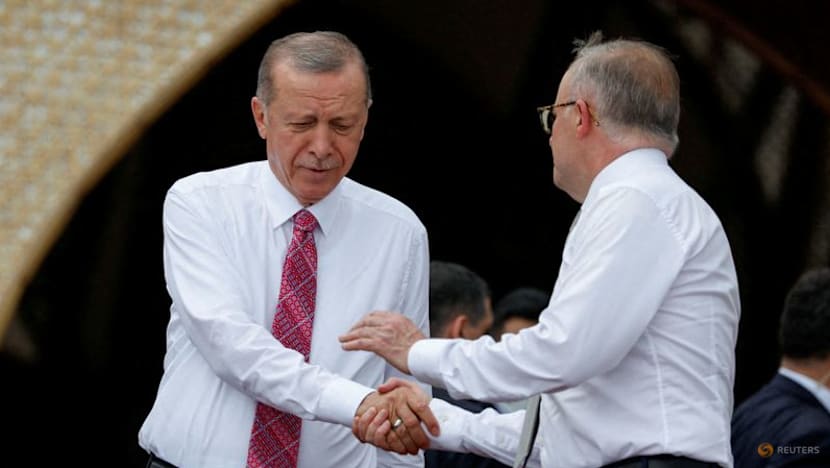Türkiye seeks to host next COP as co-presidency plans falter
Türkiye and Australia have been locked in a stalemate over which country will host COP31.

Turkey's President Tayyip Erdogan shakes hands with Australia's Prime Minister Anthony Albanese before a MIKTA photo session amidst the G20 leaders' summit in Nusa Dua, Bali, Indonesia, on Nov 15, 2022. (Photo: Reuters/Ajeng Dinar Ulfiana)
ISTANBUL: Türkiye wants to host next year's UN climate change talks and is ready to organise the event alone if there is no agreement on sharing the event, a Turkish diplomatic source told AFP on Sunday (Nov 16).
Australia and Türkiye are locked in a stalemate over who should host the 31st United Nations Climate Change Conference (COP31) in 2026.
The host is selected by consensus, so unless Australia or Türkiye withdraws or the countries agree to share the conference, both will miss out. A decision should be made at the current COP conference in Belem, Brazil.
If no consensus is reached, the summit would revert to Bonn, the German city that hosts the UN's climate secretariat.
The Turkish source said discussions with Australia at the UN General Assembly's annual meetings in September yielded initial proposals for joint management of the event and shared high-level meetings.
But a letter from Australian Prime Minister Anthony Albanese to Turkish President Recep Tayyip Erdogan rejected the agreements, citing UN rules against joint hosting and concerns about diverting COP's Pacific-focused agenda, the source said.
Ankara supports developing flexible arrangements through good-faith consultations to ensure the success of COP31, the source said.
"Türkiye continues to advocate a co-presidency model as a step to strengthen multilateralism but is prepared to host the conference independently if consensus cannot be reached," the source told AFP. Erdogan underlined this position in his response to the Australian prime minister, the source added.
"INCLUSIVENESS"
Leaders, including French President Emmanuel Macron and British Prime Minister Keir Starmer, attended a summit in Brazil from Nov 6 to Nov 7 to start COP30, but Erdogan and Albanese were not among them.
Turkish Vice President Cevdet Yilmaz attended the summit, while Australia was represented by Climate Change and Energy Minister Chris Bowen.
Brazil has appointed a representative to help resolve the disagreement between Australia and Turkey, but diplomats say that no progress has been made yet toward reaching an agreement before COP30 wraps up on Nov 21.
Some observers view Türkiye's close ties with Russia and Saudi Arabia - countries seen as hindering progress on climate action - as a potential disadvantage.
Türkiye wants COP31 to focus on the world's most vulnerable regions, with potential special sessions addressing Pacific issues, the source added.
The Turkish candidacy is framed as a call for global solidarity and constructive dialogue in climate action.
"Türkiye will continue to act on the principles of cooperation and inclusiveness rather than competition in combating climate change," the source said, adding that it invites all parties to advance the process on the basis of "constructive dialogue and mutual respect".













